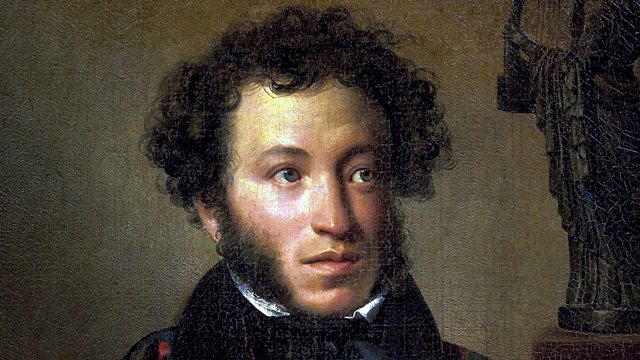Eugene Onegin
Melvyn Bragg and guests discuss Eugene Onegin by Alexander Pushkin (1799-1837), often described as his masterpiece, which tells the tragic story of Onegin, Lensky and Tatyana.
Melvyn Bragg and guests discuss Alexander Pushkin's verse novel, the story of Eugene Onegin, widely regarded as his masterpiece. Pushkin (pictured above) began this in 1823 and worked on it over the next ten years, while moving around Russia, developing the central character of a figure all too typical of his age, the so-called superfluous man. Onegin is cynical, disillusioned and detached, his best friend Lensky is a romantic poet and Tatyana, whose love for Onegin is not returned until too late, is described as a poetic ideal of a Russian woman, and they are shown in the context of the Russian landscape and society that has shaped them. Onegin draws all three into tragic situations which, if he had been willing and able to act, he could have prevented, and so becomes the one responsible for the misery of himself and others as well as the death of his friend.
With
Andrew Kahn
Professor of Russian Literature at the University of Oxford and Fellow of St Edmund Hall
Emily Finer
Lecturer in Russian and Comparative Literature at the University of St Andrews
and
Simon Dixon
The Sir Bernard Pares Professor of Russian History at University College London
Producer: Simon Tillotson.
Last on
More episodes
Previous
Next
LINKS AND FURTHER READING
��
READING LIST:
John Bayley, Pushkin. A Comparative Commentary (Cambridge University Press, 1971)
David Bethea (ed.), The Pushkin Handbook (University of Wisconsin Press, 2005)
T. J. Binyon, Pushkin: A Biography (HarperCollins, 2002)
Paul Debreczeny, The Other Pushkin: A Study of Alexander Pushkin’s Prose Fiction (Stanford University Press, 1983)
Alyssa Dinega Gillespie (ed.), Taboo Pushkin: Topics, Texts, Interpretations (University of Wisconsin Press, 2012)
Caryl Emerson, C., Boris Godunov:�� Transpositions of a Russian Theme (Indiana University Press, 1986)
Monika Greenleaf, Pushkin and Romantic Fashion: Fragment, Elegy, Orient, Irony (Stanford University Press, 1994)
Paul Hamilton (ed.), The Oxford Handbook of European Romanticism (Oxford University Press, 2016), especially “Pushkin as a Romantic” by Luba Golburt
Andrew Kahn (ed.), Cambridge Companion to Pushkin (Cambridge University Press, 2006)
Andrew Kahn, Pushkin's Bronze Horseman (Duckworth, 1998)
Andrew Kahn, Pushkin’s Lyric Intelligence (Oxford University Press, 2012)
Catriona Kelly, Russian Literature: A Very Short Introduction (Oxford University Press, 2001)
Olga Peters Hasty, Pushkin’s Tatiana, (University of Wisconsin Press, 1999)
Alice Randall, Pushkin and the Queen of Spades (Houghton Mifflin, 2004)
Stephanie, Sandler, Distant Pleasures:�� Alexander Pushkin and the Writing of Exile (Stanford University Press, 1989)
Stephanie Sandler, Commemorating Pushkin: Russia’s Myth of a National Poet (Stanford University Press, 2004)
Andrei Sinyavsky (trans. Catharine Theimer Nepomnyashchy and Slava I. Yastremski), Strolls with Pushkin (Yale University Press, 1993)
William Mills Todd III, Fiction and Society in the Age of Pushkin: Ideology, Institutions, and Narrative (Harvard University Press, 1986)
Credits
| Role | Contributor |
|---|---|
| Presenter | Melvyn Bragg |
| Interviewed Guest | Andrew Kahn |
| Interviewed Guest | Emily Finer |
| Interviewed Guest | Simon Dixon |
| Producer | Simon Tillotson |
Broadcasts
- Thu 22 Jun 2017 09:00����ý Radio 4
- Thu 22 Jun 2017 21:30����ý Radio 4
Featured in...
![]()
19th Century—In Our Time
Browse the 19th Century era within the In Our Time archive.
![]()
Culture—In Our Time
Popular culture, poetry, music and visual arts and the roles they play in our society.
In Our Time podcasts
Download programmes from the huge In Our Time archive.
The In Our Time Listeners' Top 10
If you’re new to In Our Time, this is a good place to start.
Arts and Ideas podcast
Download the best of Radio 3's Free Thinking programme.
Podcast
-
![]()
In Our Time
Melvyn Bragg and guests discuss the ideas, people and events that have shaped our world.



